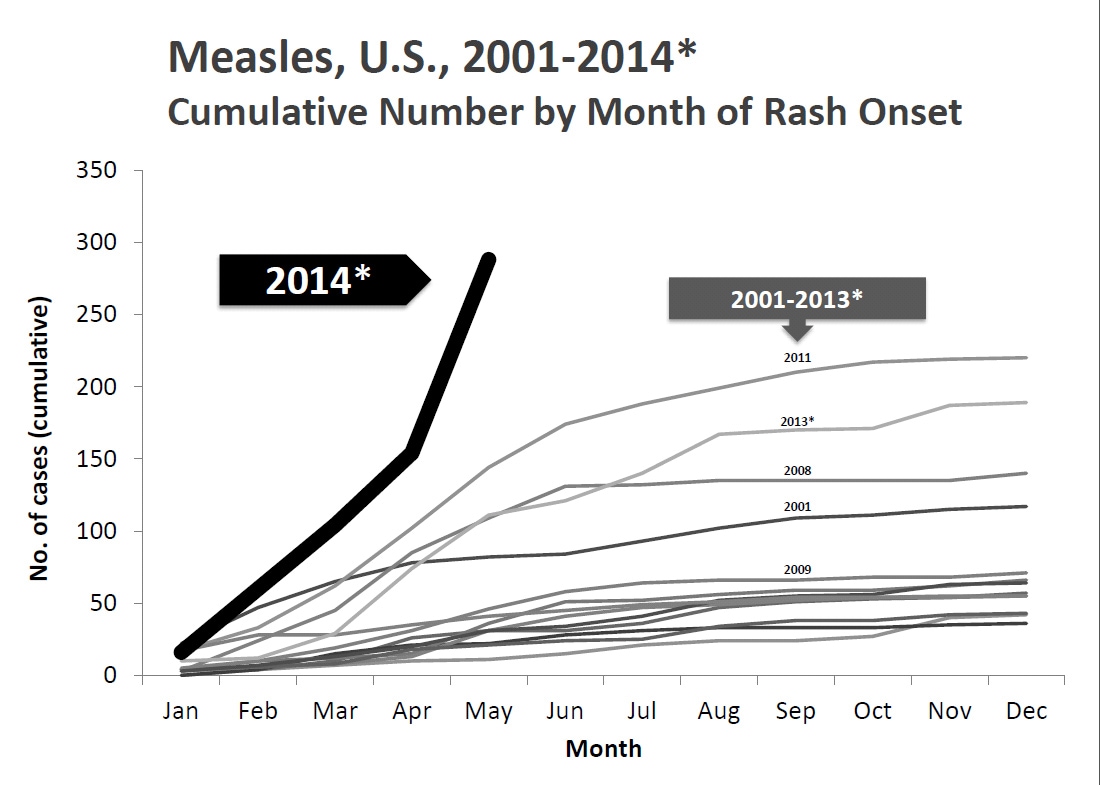
As of May 30 of this year, the CDC had confirmed
334 cases of measles nationwide. To put this in perspective: We have had more cases of measles in the first five months of this year than the total number of cases for any year since 1994.
The Measles, Mumps, and Rubella (
MMR) vaccine is one of the most controversial vaccines in the
CDC immunization schedule due to an unfounded fear that the MMR vaccine causes
autism. Over the past 20 years, there has been an increase in the number of vaccine avoiders and, as a result, the incidence of all three diseases has been increasing, most dramatically with measles.
Vaccines for each individual illness (measles, mumps and rubella) were licensed in the early 1960s and the MMR vaccine combining all three vaccines in a single injection was licensed in 1971. The vaccine lead to a drop in the incidence of all 3 diseases by
more than 99 percent. Today, misinformation and lack of government regulation have put all children, especially those at high medical risk, in grave danger from preventable disease.
MMR and AutismThe controversy with the MMR vaccine started when Andrew Wakefield (a British physician) published two fraudulent studies linking the MMR vaccination with autism. The first study, published in 1998, handpicked, with no control group, 12 children with developmental delays, eight of whom had autism, who had all received the MMR vaccine one month prior to being diagnosed. The second paper, published in 2002, claimed that MMR virus fragments were found in the intestine of 75 of 91 patients with autism and only in 5 of 70 patients who were not on the autism spectrum. Since then, many researchers have tried, unsuccessfully, to replicate these findings.
Both papers have been retracted by the journals they were printed in due to significant flaws in the research. Many reputable studies have been done, and replicated, showing no link between autism and the MMR vaccine. The
most significant study, published in 1999, studied 537,303 children, 82 percent of the children had received the MMR vaccine, and there was no difference in the number of children with autism in the vaccinated group compared to the unvaccinated group. The scientific evidence does not show any correlation between MMR vaccine and autism.
Description of DiseasesThe MMR vaccination protects individuals and the community from three serious diseases,
measles,
mumps and
rubella, which cause long term harm and death. Complications of measles include acute encephalitis (one of every 1,000 cases of measles), which results in permanent brain damage. Death, predominantly resulting from respiratory and neurologic complications, occurs in 1 to 3 of every 1000 cases of measles reported in the United States. Complication of mumps include inflammation of the brain and/or tissue covering the brain and spinal cord, deafness, inflammation of the testicles in males who have reached puberty and fertility problems, and inflammation of the ovaries and/or breasts (mastitis) in females who have reached puberty. Rubella causes birth defects if the disease is acquired by a pregnant woman. Congenital rubella causes deafness, cataracts, heart defects, mental retardation, and liver and spleen defects.
Risk of VaccineKnown common adverse events following the administration of the MMR vaccine include pain where the vaccine is given, fever, a mild rash and swollen glands in the cheeks or neck. Studies have shown a small increased risk of
febrile seizures occurs among children who are younger than seven years old approximately 8-14 days after vaccination; we expect one seizure for every 3,000 to 4,000 children given the MMR vaccine. Febrile seizures are benign single events and do not lead to other seizure disorders. No published scientific evidence shows any benefit in separating the combination MMR vaccine into three individual shots.
RecommendationAll children should get an initial dose of the MMR vaccine at 12 months of age and a booster dose when they are 4 years old.